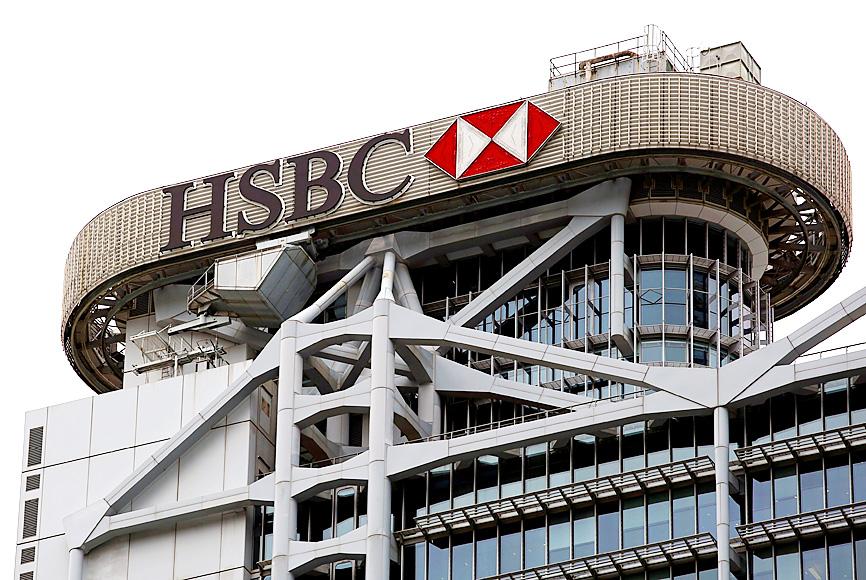HSBC Holdings PLC yesterday posted its best quarter since the COVID-19 pandemic began as an improving economic outlook drove optimism about the ability of borrowers to repay loans and its strategic reset to Asia remained on track.
First-quarter profit more than doubled as US$400 million of loan loss reserves were released, spurred by the rollout of vaccination programs in markets such as the UK.
Europe’s largest bank said that its increasing focus on servicing wealthy Asians had also got off to a strong start.

Photo: Reuters
Adjusted pretax profit of US$6.4 billion for the three months to the end of last month comfortably beat analysts’ forecasts.
The firm’s investment bank joined rivals in benefiting from active markets, as a 55 percent surge in equity trading helped lift the division’s revenue.
“The economic outlook has improved, although uncertainties remain,” HSBC chief executive officer Noel Quinn said in a statement. “We carry good momentum into the second quarter.”
Easing credit losses helped it turn around its UK business and it also posted a profit in the US even as it embarks on shifting billions of dollars to Asia.
Weighed down by low interest rates, HSBC is seeking out more fee-based income, targeting to become a leader in wealth management in an increasingly affluent Asia.
Asia continued to be its biggest profit center, but earnings there were relatively unchanged from a year earlier. It saw big jumps in profit at all of its major divisions.
With the virus restrictions easing in major markets, HSBC was boosted by the reversal in credit losses. This year, such losses are now seen below the medium-term range of 30 to 40 basis points of average loans it indicated at its latest annual results, the lender said.
However, Quinn said that the bank was watching closely developments in India, which has seen an upsurge in infections.
“We have to see how the pandemic develops in India, and we are watching very closely,” he said.
The bank said that it is continuing negotiations on a potential sale of its retail operations in France.
In the US, it is exploring “both organic and inorganic options for our retail banking franchise,” it said.
While attention has focused on the businesses it is attempting to sell, HSBC chief financial officer Ewen Stevenson said that the bank was looking at possible acquisitions, mainly focused on its Asian wealth business, which is at the heart of its strategic repositioning.
Asked about Citigroup Inc’s sales of parts of its Asian business, Stevenson said “very few of them” would be a good fit for HSBC.
“We are looking at other options in the region, predominantly in the wealth space,” Stevenson said in a Bloomberg Television interview.
HSBC has also spent the past year adapting its working practices as a result of the pandemic.
Quinn this month said that he would turn the entire executive floor of the bank’s London headquarters into meeting rooms and it eventually aims to cut its office space by about 40 percent.
It aims to cut its global office footprint by about 20 percent this year, HSBC said.

South Korea’s equity benchmark yesterday crossed a new milestone just a month after surpassing the once-unthinkable 5,000 mark as surging global memory demand powers the country’s biggest chipmakers. The KOSPI advanced as much as 2.6 percent to a record 6,123, with Samsung Electronics Co and SK Hynix Inc each gaining more than 2 percent. With the benchmark now up 45 percent this year, South Korea’s stock market capitalization has also moved past France’s, following last month’s overtaking of Germany’s. Long overlooked by foreign funds, despite being undervalued, South Korean stocks have now emerged as clear winners in the global market. The so-called “artificial intelligence

Chinese artificial intelligence (AI) start-up DeepSeek’s (深度求索) latest AI model, set to be released as soon as next week, was trained on Nvidia Corp’s most advanced AI chip, the Blackwell, a senior official of US President Donald Trump’s administration said on Monday, in what could represent a violation of US export controls. The US believes DeepSeek will remove the technical indicators that might reveal its use of American AI chips, the official said, adding that the Blackwells are likely clustered at its data center in Inner Mongolia, an autonomous region of China. The person declined to say how the US government received

‘SEISMIC SHIFT’: The researcher forecast there would be about 1.1 billion mobile shipments this year, down from 1.26 billion the prior year and erasing years of gains The global smartphone market is expected to contract 12.9 percent this year due to the unprecedented memorychip shortage, marking “a crisis like no other,” researcher International Data Corp (IDC) said. The new forecast, a dramatic revision down from earlier estimates, gives the latest accounting of the ongoing memory crunch that is affecting every corner of the electronics industry. The demand for advanced memory to power artificial intelligence (AI) tasks has drained global supply until well into next year and jeopardizes the business model of many smartphone makers. IDC forecast about 1.1 billion mobile shipments this year, down from 1.26 billion the prior

FORTUNES REVERSED: The new 15 percent levies left countries with a 10 percent tariff worse off and stripped away the advantage of those with a 15 percent rate In a swift reversal of fortunes, countries that had been hardest hit by US President Donald Trump’s tariffs have emerged as the biggest winners from the US Supreme Court’s decision to strike down his emergency levies. China, India and Brazil are among those now seeing lower tariff rates for shipments to the US after the court ruled Trump’s use of the International Emergency Economic Powers Act to impose duties was illegal. While Trump subsequently announced plans for a 15 percent global rate, Bloomberg Economics said that would mean an average effective tariff rate of about 12 percent — the lowest since